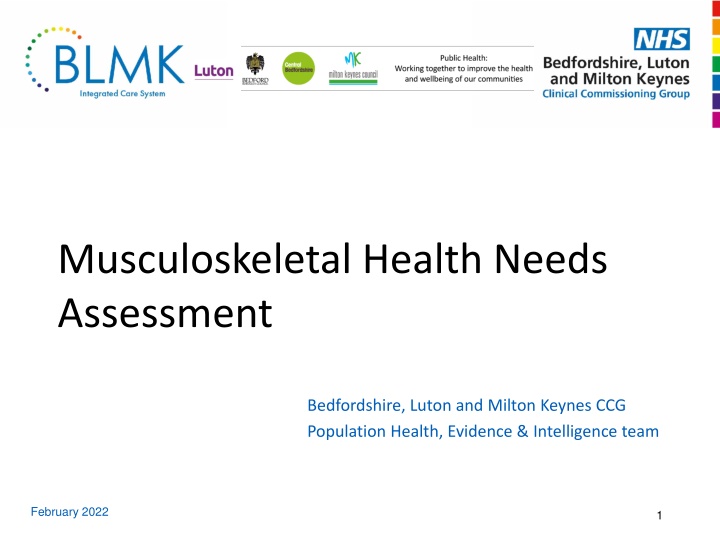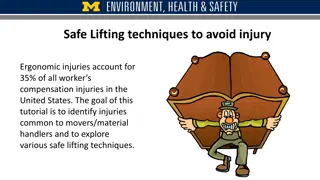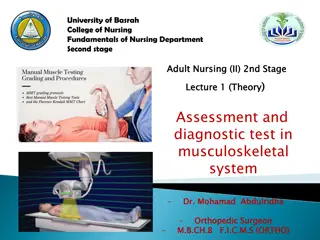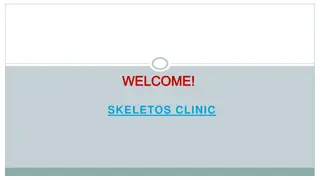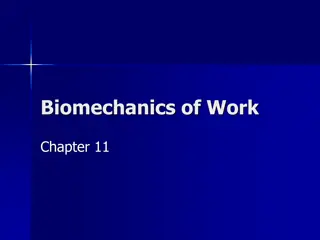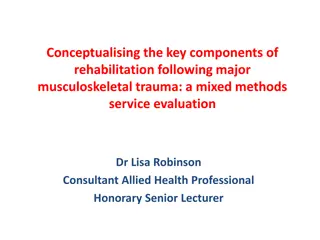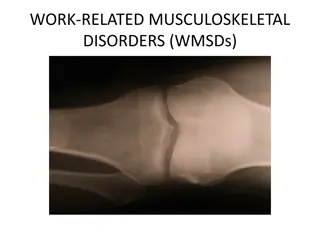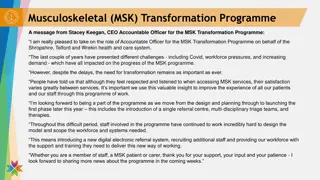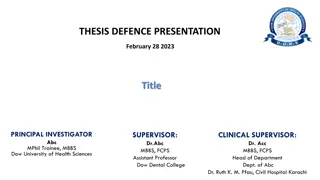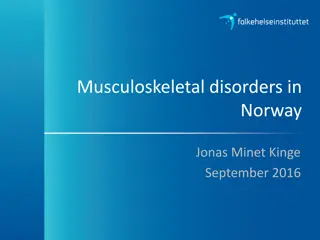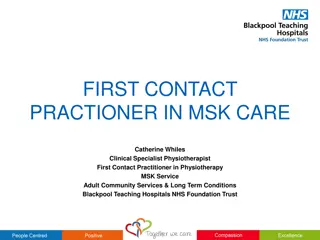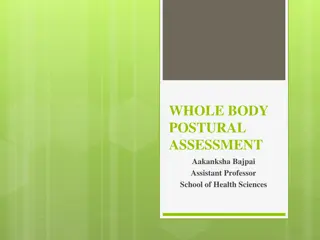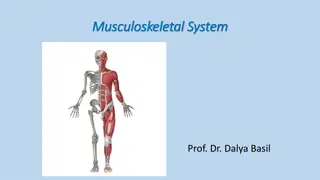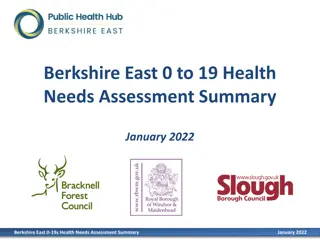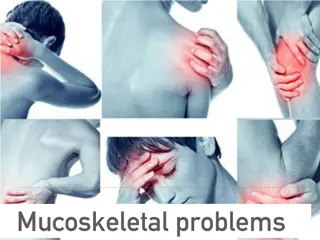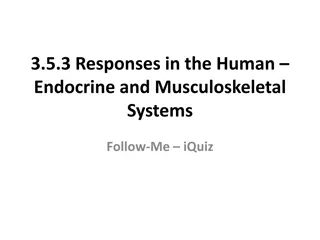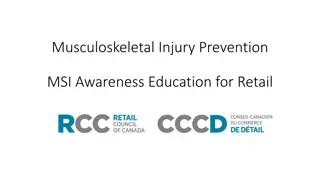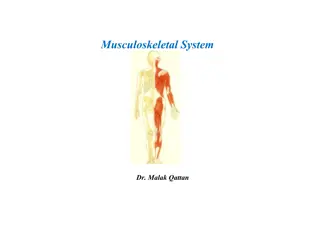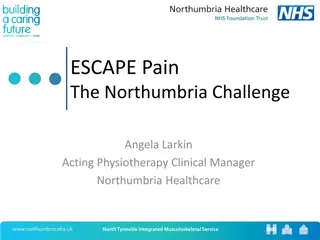Musculoskeletal Health Needs Assessment - Insights and Data
This report provides an in-depth analysis of musculoskeletal health needs in the Bedfordshire, Luton, and Milton Keynes region, highlighting areas of unmet needs, prevalence of MSK conditions, and population demographics. The assessment aims to inform future healthcare planning and service delivery to address the high burden of diseases and morbidity related to MSK conditions.
Download Presentation

Please find below an Image/Link to download the presentation.
The content on the website is provided AS IS for your information and personal use only. It may not be sold, licensed, or shared on other websites without obtaining consent from the author.If you encounter any issues during the download, it is possible that the publisher has removed the file from their server.
You are allowed to download the files provided on this website for personal or commercial use, subject to the condition that they are used lawfully. All files are the property of their respective owners.
The content on the website is provided AS IS for your information and personal use only. It may not be sold, licensed, or shared on other websites without obtaining consent from the author.
E N D
Presentation Transcript
Musculoskeletal Health Needs Assessment Bedfordshire, Luton and Milton Keynes CCG Population Health, Evidence & Intelligence team February 2022 1
What is BLMK? It stands for Bedfordshire, Luton & Milton Keynes and it is a Clinical Commissioning Group which is part of the NHS Much of the data in this needs assessment is from the comprising four Local Authorities: Bedford Borough, Central Bedfordshire, Luton & Milton Keynes councils However, the health area of BLMK is slightly larger than the total areas of the four local authorities 2
Why are we doing MSK Needs Assessment? BLMK-wideMSK commissioning unit is due to review providers contracts High burden of disease from MSK conditions and large morbidity from common MSK conditions There are areas of unmet need There will be cost implications on health and social care services Should focus on prevention Models of care to broadly define the way health services should be delivered Project future needs, for example: Population size and aging Changes in risk factors (e.g. obesity) 3
Scope The three groups of MSK conditions that are used in this needs assessment are obtained from the Global Burden of Disease: 1. Inflammatory conditions 2. Conditions of MSK pain 3. Osteoporosis and fragility fractures (falls pathway covered in a separate area) 4
Population overview The proportion of minority ethnic groups differs widely for the councils in BLMK: 6% (Central Bedfordshire), 20% (Bedford Borough/Milton Keynes), 45% (Luton) Deprivation varies in our local authorities from least deprived to 4th more deprived. You would expect better health outcomes in less deprived areas. However, at smaller geographical areas, this can vary to a greater degree which we may not be able to measure The 10 year population projection estimates a change of between: -3.8% (Luton) and 6.8% (Central Bedfordshire). The largest change for BLMK is for 16-24 (16%) and 65+ years (24%) (ONS) 5
Overview of MSK conditions 21% of the Global Burden of Disease is due to MSK conditions in the UK. Although MSK conditions tend to be long term they are less likely to be a cause of death. Many years of life can be impacted by disability and this is measured in years lived with disability (YLD). These make household, work and social activities harder, which also affect mental wellbeing and potentially lead to isolation. 725 people over 65 years old fractured their hip in BLMK (2020/21). Much of these fragility fractures are due to osteoporosis so we need to target both the fractures and osteoporosis. Compared to the national average, the rate of falls in people over the age of 65 is significantly higher in Luton, Bedford is significantly lower. The Falls Pathway is currently being reviewed and re-designed. 6
National MSK Needs About 10-30% of GP consultations are accounted for by MSK conditions. MSK conditions are 7.3% of hospital admissions in England (2019-20) accounting for 1.26 million finished admission episodes. Half of the expected number of joint replacements were carried out in 2020 due to COVID-19, leaving a higher demand on the service. 7
BLMK MSK Needs 30% of the cases of work-related ill health are MSK conditions (second most common cause). QoL 1.0 Average Quality of Life (QoL) score is close to 0.60 for people with MSK conditions living in BLMK CCG, significantly worse than adults without a long-term condition (0.92). Better Worse 0.0 8
Long-term MSK conditions The prevalence of long-term MSK conditions nationally is 18.6% The majority of these (13.2% of the total) have at least 2 long term conditions The prevalence of long-term MSK conditions is between 14.9% - 17.5% in the BLMK Local Authorities 9
Fit notes* for Employment The median of mental health conditions and back pain is 3 weeks The commonest fit notes for BLMK and England, 2017-21 Fit notes 2017-21 (episodes) Diagnosis BLMK BLMK % England % Mental and behavioural disorders 3,893 22.6% 26.6% Diseases of the musculoskeletal system and connective tissue 2,759 16.0% 14.5% Diseases of the respiratory system 1,825 10.6% 8.1% Symptoms, signs and abnormal clinical and laboratory findings 988 5.7% 7.0% Factors influencing health status and contact with health services 913 5.3% 6.3% Injury, poisoning and certain other consequences of external causes 1,318 7.7% 5.9% Please note the above does not include diagnosis Not Provided or Unknown Source: NHS digital, 2021 10 *previously known as sick notes
Mental health needs in BLMK We could do more to address the mental health of patients with MSK conditions. 20-26% of patients in the Local Authorities in BLMK who report a long-term MSK problem also reports depression or anxiety. There are successful interventions to help mental health such as Improve Access to Psychological Therapies (IAPT) or cognitive behavioral therapy (CBT) 11
Preventative needs: Prevalence of risk factors in Local Authorities in BLMK 80 70 60 % 50 40 30 20 10 0 Excess weight Physically inactive Smoking Bedford Borough Central Bedfordshire Luton Milton Keynes 12
MSK services - community Location Bedford Borough and Central Bedfordshire Luton Milton Keynes Provider Circle Integrated Care HRG Healthcare Connect Health Ravenscroft Health Type of service Triage, Treat and refer onwards Physiotherapy Conservative Management Therapies inc. injections, ultrasound-guided injections, Shockwave Therapy, and Apos Therapy Boots Nerve Conduction diagnostics Pain Management programmes Rheumatology in Early Inflammatory Arthritis Clinic Triage, Treat and refer onwards Physiotherapy Conservative Management Therapies inc. injections, Pain management programmes Tier 1 physiotherapy only Triage, Treat and refer onwards Physiotherapy Tier 2+ Triage, Treat and refer onwards Pain Management programmes Conservative Management Therapies inc. injections, ultrasound-guided injections Number of referrals received (2019/20) 50,000 15,000 16,000 9,000 13
MSK services - pain and mental health MSK services all provide varying levels of pain management services Improving Access to Psychological Therapies (IAPT) offer help for common mental health problems such as anxiety and depression. IAPT service provides support for: Initial mental health diagnosis Psychological formulation/ bio-psycho-social approach to wellbeing A holistic view of managing MSK pain in addition to the physical component IAPT receives self referral and referrals from GP and community services 14
MSK services secondary care Lower back pain The table below shows the most common non-elective (emergency) admissions for MSK conditions in BLMK. Other includes a variety of conditions that individually have very low numbers, such as osteomyelitis. The figures for 2020 & 2021 were reduced due to the pandemic. Lower back pain is the most frequent- this is a potential target to reduce emergency admissions. Condition Arthrosis Gout Juvenile Lower Back Pain Osteoporosis Rheumatoid Other Total 2017 15 40 2018 25 71 2019 33 74 2020 18 43 2021 6 52 1 156 4 5 6 4 201 325 306 191 8 2 7 7 0 26 210 525 33 274 772 21 307 800 22 13 213 473 286 622 15
Impact of Covid on MSK Services During 2020, routine elective orthopaedic procedures and consultations were cancelled leaving a back log of patients waiting to be seen. In October 2021, 2,350 patients were waiting for procedures and a further 4,350 for consultations. Knee replacement waiting time: 45 weeks Hip replacement waiting time: 56 weeks In November 2021, over 4,000 patients were waiting over 10 weeks for treatment in the community, half of these were for level 1 Physiotherapy. In the community, there are multiple challenges in the services: staff sickness or redeployment lack of appointments and increased waiting times. increase in complexity of patients potential communication gap between clinicians and patients 16
System-level recommendations Prevention services in primary and community settings should: Promote physical activity in all ages Increase smoking cessation support, targeted to areas of higher prevalence Strengthen MSK service links with the falls prevention pathway, which is currently under review Strengthening MSK services in the community would reduce inappropriate demands on acute care. MSK services should focus on: Community and digital-based interventions to empower patients self management Multi-disciplinary care models which incorporates a wider range of clinical and non-clinical staff to support patients, with posts such as: First contact MSK practitioners Social prescribers and care co-ordinators Physiotherapist, pain and mental health professionals 17
System-level recommendations Referral pathways should be lean and clear between primary, community and secondary care Secondary care should support community care to facilitate diagnostics and therefore early diagnosis Communication regarding patient care should be streamlined between all providers including MDTs where appropriate Communication channels should be kept open between services and the patient Contract management should ensure standardisation of service performance and provision across BLMK 18
System-level recommendations Assistance should be provided for patients awaiting definitive treatment to ensure they do not deteriorate. This would include signposting to self-help groups, exercise classes, weight management, pain management, social services, Occupational Therapy (OT) and IAPT There should be standardisation of outcome measures across BLMK in community services Minimum data sets should be standardised across services to enable informed decision-making and benchmarking 19
Pain and mental health services recommendations Specifically for lower back pain, primary care services should consider how to risk stratify young people and adults presenting with a new episode of low back pain with or without sciatica based on biological, psychological, and social factors Use of opioids, spinal injections, and imaging should follow clinical guidelines To increase access and engagement, a hybrid digital and face-to-face service should be offered, and patient outcomes should be monitored for these initiatives 20
Pain and mental health services recommendations There should be a higher level of awareness of mental health needs in community MSK services, e.g. physiotherapist and GP to consider IAPT referral in chronic MSK patients The system should ensure patient records are shared between relevant services as appropriate to improve patient care e.g. community MSK service and IAPT to improve patient care 21
References Population Ethnicity- https://www.ons.gov.uk/peoplepopulationandcommunity/populationandmigration Deprivation- https://fingertips.phe.org.uk/ Population projection- https://www.ons.gov.uk/peoplepopulationandcommunity/populationandmigration MSK conditions Global Burden of Disease- https://vizhub.healthdata.org/gbd-compare MSK long-term conditions, mental health & preventative needs https://fingertips.phe.org.uk/profile/msk/data#page/1 MSK Needs Work-related health- https://www.hse.gov.uk/statistics/cost.htm Quality of Life- https://www.versusarthritis.org/ Fit notes NHS digital, 2021- https://digital.nhs.uk/services/fit-notes 22
